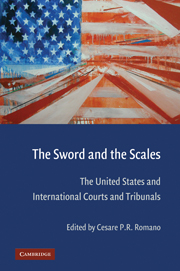Book contents
- Frontmatter
- Contents
- Preface
- Acknowledgments
- Abbreviations
- Contributors
- 1 International Courts and Tribunals and the Rule of Law
- 2 American Public Opinion on International Courts and Tribunals
- 3 Arbitration and Avoidance of War: The Nineteenth-Century American Vision
- 4 The United States and the International Court of Justice: Coping with Antinomies
- 5 The U.S. Supreme Court and the International Court of Justice: What Does “Respectful Consideration” Mean?
- 6 U.S. Attitudes toward International Criminal Courts and Tribunals
- 7 The United States and the Inter-American Court of Human Rights
- 8 From Paradox to Subsidiarity: The United States and Human Rights Treaty Bodies
- 9 The U.S. and International Claims and Compensation Bodies
- 10 Does the United States Support International Tribunals? The Case of the Multilateral Trade System
- 11 The United States and Dispute Settlement under the North American Free Trade Agreement: Ambivalence, Frustration, and Occasional Defiance
- 12 Dispute Settlement under NAFTA Chapter 11: A Response to the Critics in the United States
- 13 The United States and International Courts: Getting the Cost-Benefit Analysis Right
- Index
- References
4 - The United States and the International Court of Justice: Coping with Antinomies
Published online by Cambridge University Press: 05 June 2012
- Frontmatter
- Contents
- Preface
- Acknowledgments
- Abbreviations
- Contributors
- 1 International Courts and Tribunals and the Rule of Law
- 2 American Public Opinion on International Courts and Tribunals
- 3 Arbitration and Avoidance of War: The Nineteenth-Century American Vision
- 4 The United States and the International Court of Justice: Coping with Antinomies
- 5 The U.S. Supreme Court and the International Court of Justice: What Does “Respectful Consideration” Mean?
- 6 U.S. Attitudes toward International Criminal Courts and Tribunals
- 7 The United States and the Inter-American Court of Human Rights
- 8 From Paradox to Subsidiarity: The United States and Human Rights Treaty Bodies
- 9 The U.S. and International Claims and Compensation Bodies
- 10 Does the United States Support International Tribunals? The Case of the Multilateral Trade System
- 11 The United States and Dispute Settlement under the North American Free Trade Agreement: Ambivalence, Frustration, and Occasional Defiance
- 12 Dispute Settlement under NAFTA Chapter 11: A Response to the Critics in the United States
- 13 The United States and International Courts: Getting the Cost-Benefit Analysis Right
- Index
- References
Summary
Since 1946, the United States has had an uneasy relationship with the International Court of Justice (ICJ, the World Court, or the Court). On one hand, the United States embraces the rule of law within its own society and, in principle, within the international system of states. The United States has been and remains an active participant in cases before the Court, appearing before it several times, more than any other state, even in recent years. On the other hand, the United States has never been willing to submit itself to the plenary authority of the Court and has typically reacted negatively to decisions by the Court that are adverse to U.S. interests. As is well known, in response to decisions that were reached by the Court, the United States refused to participate in the proceedings on the merits of the case brought by Nicaragua in 1984, withdrew from the Court's compulsory jurisdiction in 1986, and recently terminated its acceptance of the Court's jurisdiction over disputes arising under the Vienna Convention on Consular Relations.
This chapter addresses certain salient aspects of the U.S. relationship with the ICJ. Following this introduction, Part A briefly sets forth three antinomies (i.e., equally rational but conflicting principles) in U.S. foreign relations that have had important ramifications for the U.S. relationship with the Court from the outset. First, the United States operates on the basis of conflicting principles with respect to the relevance of international law and institutions for U.S. foreign policy.
- Type
- Chapter
- Information
- The Sword and the ScalesThe United States and International Courts and Tribunals, pp. 46 - 111Publisher: Cambridge University PressPrint publication year: 2009
References
- 1
- Cited by



